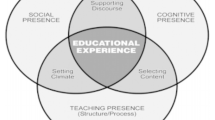
Overview
- Written in a tutorial-style
- Includes reproducible examples and demos
- Provides aesthetic visual analytics
- Extends the analysis instruments significantly beyond doc-term mapping
- Provides a technological framework and methodology for study and research
Access this book
Tax calculation will be finalised at checkout
Other ways to access
About this book
This book introduces Meaningful Purposive Interaction Analysis (MPIA) theory, which combines social network analysis (SNA) with latent semantic analysis (LSA) to help create and analyse a meaningful learning landscape from the digital traces left by a learning community in the co-construction of knowledge.
The hybrid algorithm is implemented in the statistical programming language and environment R, introducing packages which capture – through matrix algebra – elements of learners’ work with more knowledgeable others and resourceful content artefacts. The book provides comprehensive package-by-package application examples, and code samples that guide the reader through the MPIA model to show how the MPIA landscape can be constructed and the learner’s journey mapped and analysed. This building block application will allow the reader to progress to using and building analytics to guide students and support decision-making in learning.
Similar content being viewed by others
Keywords
Table of contents (12 chapters)
-
Front Matter
-
Back Matter
Authors and Affiliations
About the author
Dr Fridolin Wild is a Senior Research Fellow, leading the Performance Augmentation Lab (PAL) of Oxford Brookes University. With the research and development of the lab, Fridolin seeks to close the dissociative gap between abstract knowledge and its practical application, researching radically new forms of linking directly from knowing something ‘in principle’ to applying that knowledge ‘in practice’ and speeding its refinement and integration into polished performance.
Fridolin is leading numerous EU, European Space Agency, and nationally funded research projects, including WEKIT, TCBL, ARPASS, Tellme, TELmap, cRunch, Stellar, Role, LTfLL, iCamp, and Prolearn. Fridolin is the voted treasurer of the European Association of Technology Enhanced Learning (EATEL) and leads its Special Interest Group on Wearable-Enhanced Learning (SIG WELL). He chairs the working group on Augmented Reality Learning Experience Models (ARLEM) of the IEEE Standards Association as well as the Natural Language Processing task view of the Comprehensive R Archive Network (CRAN).Fridolin also holds the post as Research Fellow of the Open University of the UK. Before, Fridolin worked as a researcher at the Vienna University of Economics and Business in Austria from 2004 to 2009. He studied at the University of Regensburg, Germany, with extra-murals at the Ludwig Maximilian University of Munich and the University of Hildesheim.
Bibliographic Information
Book Title: Learning Analytics in R with SNA, LSA, and MPIA
Authors: Fridolin Wild
DOI: https://doi.org/10.1007/978-3-319-28791-1
Publisher: Springer Cham
eBook Packages: Computer Science, Computer Science (R0)
Copyright Information: Springer International Publishing Switzerland 2016
Hardcover ISBN: 978-3-319-28789-8Published: 11 April 2016
Softcover ISBN: 978-3-319-80425-5Published: 25 April 2018
eBook ISBN: 978-3-319-28791-1Published: 04 April 2016
Edition Number: 1
Number of Pages: XV, 275
Number of Illustrations: 47 b/w illustrations, 59 illustrations in colour
Topics: Data Mining and Knowledge Discovery, Computational Linguistics, Mathematics in the Humanities and Social Sciences, Educational Technology, Philosophy of Language



